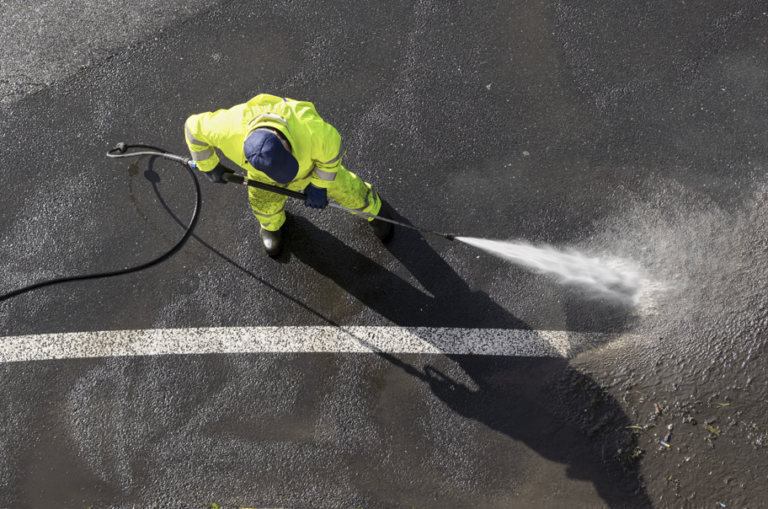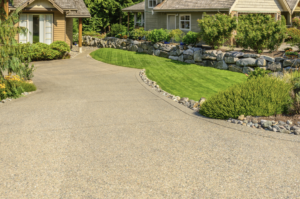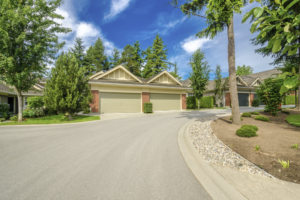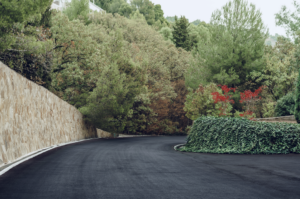Pressure washing can be a game-changer for tired, stained asphalt driveways. When done right, it lifts away years of grime and brings back that clean, dark finish. But if you’re not careful, what starts as cleaning can end up causing damage.
Why Pressure Washing Asphalt Takes Skill
Asphalt may look tough, but it’s not indestructible. Beneath that smooth black surface lies a blend of aggregate and binder that can be stripped, chipped, or broken down under excessive force. The key to cleaning it well (without damaging it) is knowing your pressure, distance, and technique.
Too many homeowners rent a machine, blast the driveway on high, and walk away thinking they’ve done a good job. What they don’t realize is that the surface binder can be damaged in the process. That leads to premature wear and opens the door for water intrusion, cracking, and potholes.
How to Prepare Your Driveway for Pressure Washing
Before turning on the water, clear the area to prevent any potential hazards. Move vehicles, planters, and outdoor furniture away from the driveway. Sweep thoroughly to remove loose dirt, leaves, and pebbles. Pay attention to any oil stains or algae buildup. These items will require pretreatment (typically a degreaser or mild detergent) to loosen them before washing.
Now, check your surface. If your asphalt is already cracked, crumbling, or in poor condition, pressure washing may do more harm than good. In such cases, patching and sealing should be the first priority. Pressure washing is most effective when used on driveways that are structurally sound but just need a visual refresh.
It’s also smart to protect nearby areas. If your driveway borders a garden bed or wood siding, cover those with plastic sheeting or tarps to prevent overspray and accidental damage.
What pressure setting should you use on asphalt?
This is where many people make a costly mistake. High pressure does not mean better cleaning when it comes to asphalt. In fact, anything over 3,000 PSI is generally too much. The sweet spot for pressure washing asphalt is between 1,500 and 2,800 PSI. That’s strong enough to remove dirt, algae, and stains but gentle enough to preserve the integrity of the surface.
Use a wide-angle nozzle, usually a 25- or 40-degree tip, and hold the wand at least 12 inches above the surface. This spreads out the pressure and prevents gouging or cutting into the asphalt. Keep the wand moving at a steady pace. Staying in one spot for too long (even just a few seconds) can scar the surface or leave permanent streaks.
If you’re using a detergent, apply it first with low pressure. Let it sit for five to ten minutes so it can break down oils and grime. Then rinse thoroughly, working from the high end of the driveway down to the street or drainage area.
Should you use hot water or cold?
For most residential asphalt cleaning, cold water is sufficient, especially when combined with a good detergent. Hot water can be helpful for stubborn grease or oil stains, but it’s not necessary for regular maintenance. In fact, applying heat to already sun-softened asphalt (such as during summer) can increase the risk of surface damage.
Cold water pressure washers are more common and safer for DIY use. If you’re considering hot water, it’s best to consult a professional to make sure the temperature and pressure won’t compromise your driveway.
Can you damage asphalt by pressure washing?
Yes, and it happens more often than people think. Using too much pressure, the wrong nozzle or an aggressive technique can strip away the top layer of your driveway. Once that protective binder is gone, the aggregate underneath is exposed and vulnerable. Water begins to seep in, and the freeze-thaw cycle starts working against you.
In addition to physical damage, careless pressure washing can also drive water beneath the surface if the driveway isn’t sealed. That’s why pressure washing should always be followed up with sealing if your asphalt hasn’t been treated recently.
At Walt’s Paving, we often see damage that could’ve been avoided with just a little guidance. It’s one of the reasons we recommend scheduling a maintenance check before firing up that machine. A quick inspection ensures the timing is correct, the surface is sound, and the equipment you plan to use won’t do more harm than good.
How often should you pressure wash an asphalt driveway?
For most homes, once a year is plenty. Spring or early summer is ideal since it cleans away winter residue and preps the surface for sealcoating if needed. More frequent cleaning may be appropriate if your driveway sees heavy traffic, a shade that encourages algae, or regular exposure to vehicle fluids.
That said, more is not always better. Over-washing can wear down the surface, just like over-sanding a hardwood floor. When in doubt, wash gently and only when the buildup justifies it. Regular sweeping and spot cleaning goes a long way in keeping your asphalt looking sharp between full washes.
When to Call the Pros
If your driveway has stubborn stains, years of built-up algae, or uneven surfaces, it may be time to bring in a professional crew. Not only do they have commercial-grade equipment (and the knowledge to use it correctly), but they can also spot trouble areas before they become expensive problems.
Professionals can also combine cleaning with other maintenance tasks, such as crack filling or sealcoating, to help you protect your investment. At Walt’s Paving, we offer comprehensive driveway care, so you don’t have to guess your way through it.
Clean Asphalt Without the Risk
Pressure washing is one of the fastest ways to bring back that rich, black look of fresh asphalt. But like anything worth doing, it’s worth doing right. Start with the right tools, use proper technique, and avoid the temptation to go full blast. A careful approach leaves your driveway looking great and performing even better.
And when in doubt, give the experts at Walt’s Paving a call. We’ve helped countless homeowners across Indiana keep their driveways clean, sealed, and ready to handle whatever the seasons bring. Let us help you keep your asphalt strong, safe, and looking its best.
How can Walt’s Paving help?
You can count on Walt’s Paving to complete your residential or commercial paving project in an efficient and timely manner. We have over 40 years of experience paving asphalt driveways, making asphalt repairs, and sealcoating asphalt. We are located in Osceola, IN, and service homeowners and businesses within 50 miles of Elkhart, IN. Call us today.







